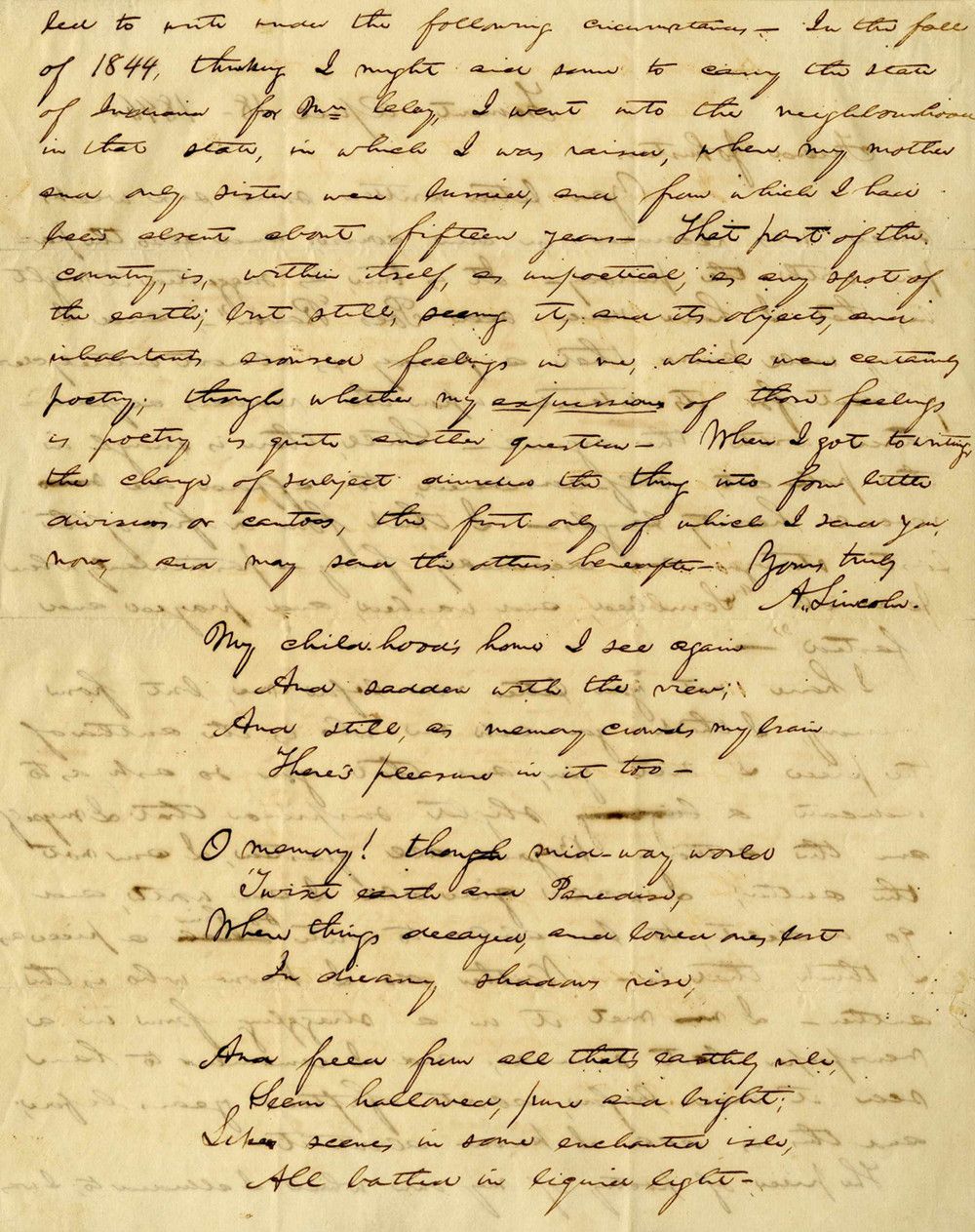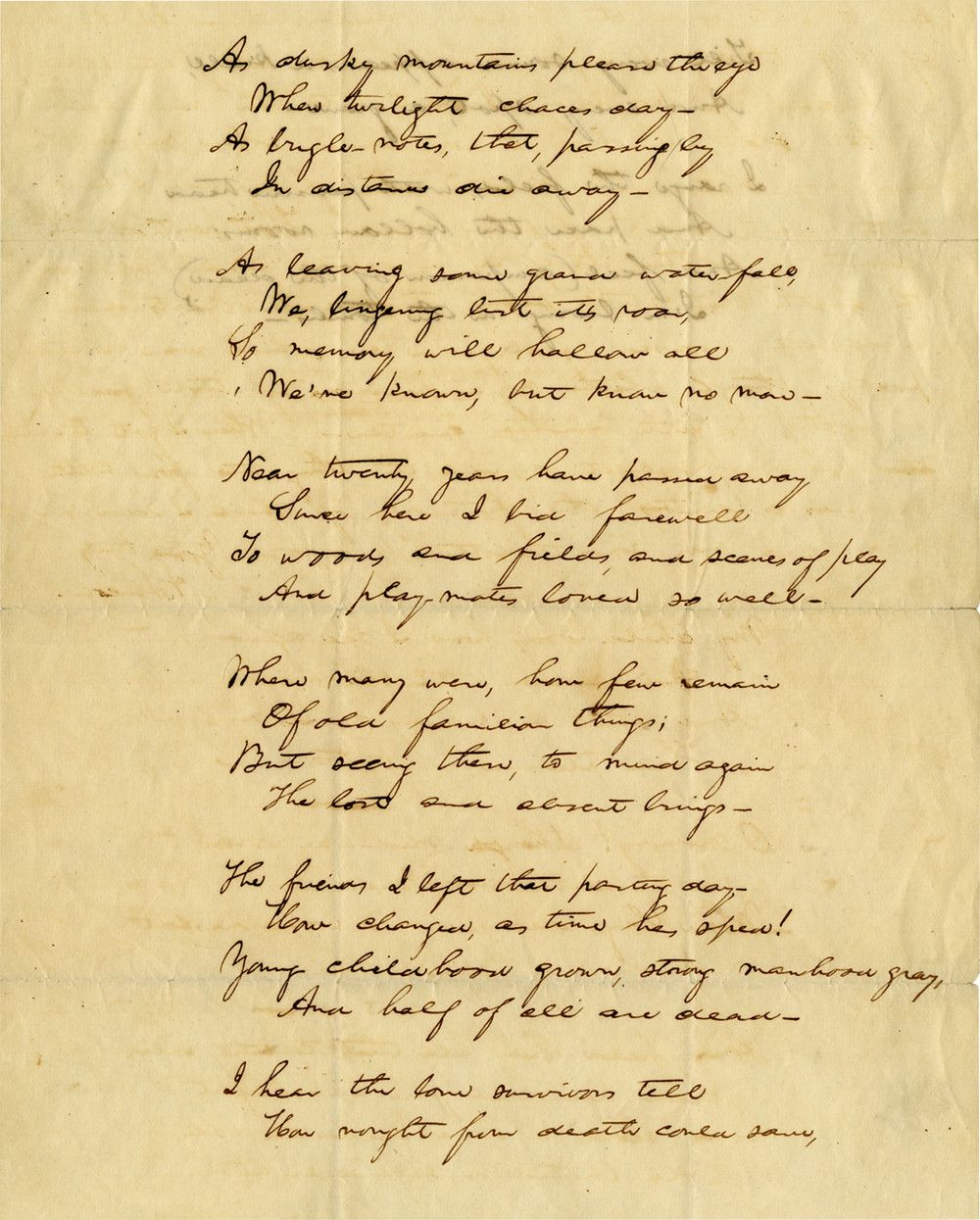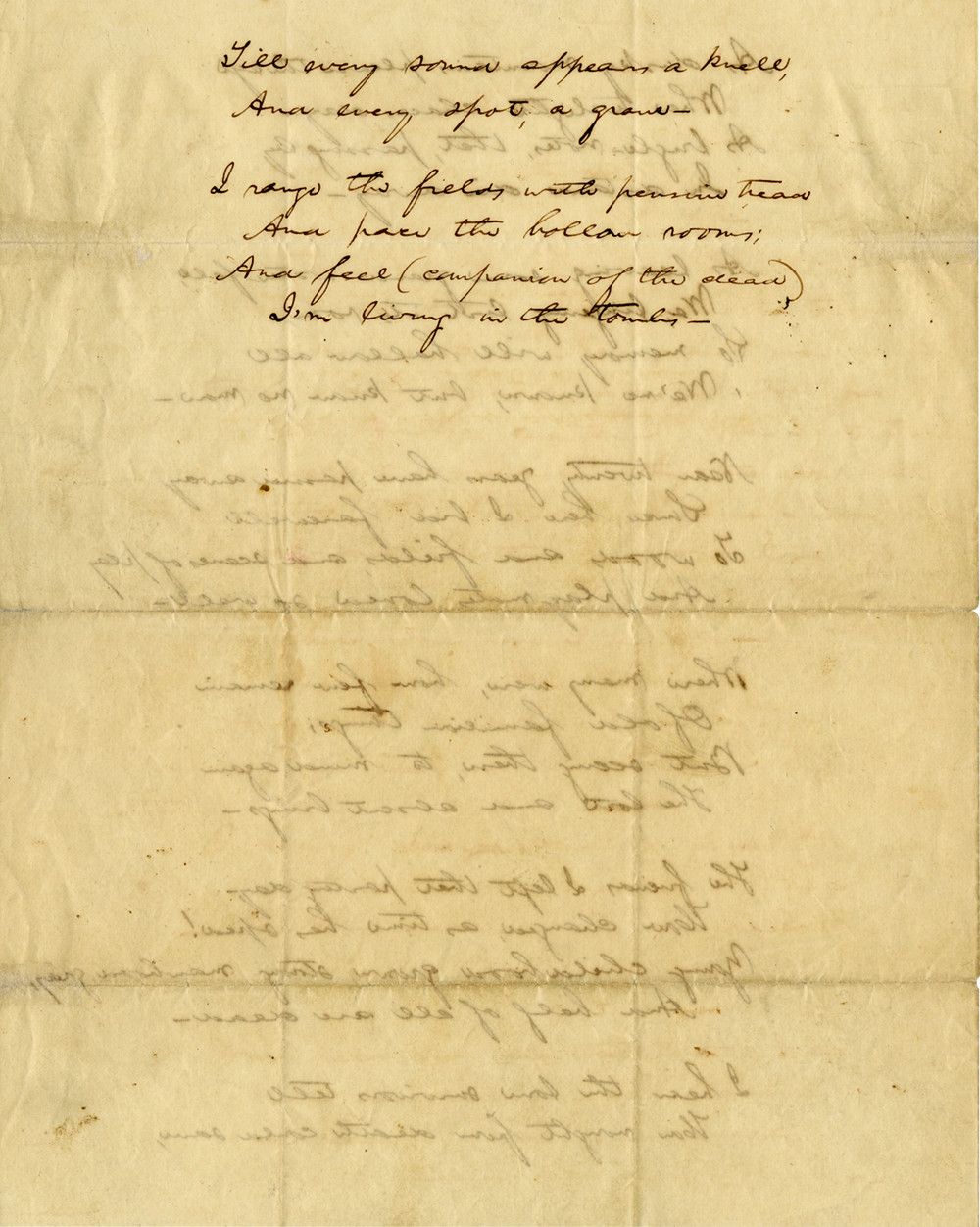Emotions in My Childhood Home I See Again
Background
Poetry is not a turning loose of emotion, only an escape from emotion; it is not the expression of personality, but an escape from personality. But, of course, only those who take personality and emotion know what it means to want to escape from such things .
- T.South. Eliot
Whether Lincoln, during the grade of his lifetime, wrote millions of words, or merely hundreds of thousands, one stark fact emerges: less than a thousand of them had to do with the quarter of his life he spent growing up in Spencer County, Indiana. This letter and accompanying poem contains and then, roughly half of what the most literary of all American presidents would write on the most unmentioned bailiwick of his childhood. Information technology is a seminal account, and in it, may be plant both the cause, and upshot, of his profound reticence.
Information technology is non surprising, really, that and so vast a world as childhood's determinative emotions would, by Lincoln, be couched in the exact equivalent of nutshells: under discussion, then, is poetry. Lincoln reports he has non yet read Poe'south "The Raven; enjoyed, withal, a parody of information technology, "The Pole-Cat", lately published in the Quincy Whig; and thinks William Knox'southward dirge-similar "Mortality", superb. Indeed, he declares, he "would give all I am worth, and go in debt, to be able to write" such a work. No doubt its lugubrious references to a expressionless mother and child, brought next to mind his ain composition; and hither Lincoln, in explaining its origins, mentions the virtually unmentionable: those two sudden and terrible losses, of his dearest mother when he was nine, and of his sister a decade subsequently.
The piece of poetry of my ain which I alluded to, I was led to write under the following circumstances. In the fall of 1844, thinking I might help some to deport the Country of Indiana for Mr. Clay, I went into the neighborhood in that State in which I was raised, where my mother and simply sister were buried, and from which I had been absent about fifteen years. That part of the country is, inside itself, every bit unpoetical as any spot of the earth; but however, seeing it and its objects and inhabitants angry feelings in me which were certainly poetry; though whether my expression of those feelings is poetry is quite another question. When I got to writing, the alter of subjects divided the thing into iv little divisions or cantos, the first only of which I send you now...
Lincoln mentioned but one other fourth dimension, in writing, the death of his mother and never, but hither, his sister. Indeed, except for three scant entrada-generated autobiographical references; a brief response, to an erstwhile Spencer Canton, Indiana employer, about canvassing there as the Republican nominee; and this, the virtually revealing of all his words on the bailiwick - expressed, chiefly, in poetry - nothing, apparently, could fairly draw, as a human being, what he felt as a boy, growing up in Indiana. All he had to say, apparently, he said here, as follows:
My childhood home I see over again, O Retention! thou midway world And, freed from all that's earthly vile, As dusky mountains please the eye Equally leaving some one thousand waterfall, Near 20 years take passed away Where many were, merely few remain The friends I left that parting solar day, I hear the loved survivors tell I range the fields with pensive tread,
And sadden with the view;
And withal, as retentiveness crowds my brain,
At that place's pleasure in it too.
'Twixt earth and paradise,
Where things decayed and loved ones lost
In dreamy shadows rise,
Seem hallowed, pure, and bright,
Like scenes in some enchanted isle
All bathed in liquid lite.
When twilight chases day;
As bugle-notes that, passing by,
In distance die away;
We, lingering, listing its roar—
And then memory volition hallow all
Nosotros've known, just know no more.
Since hither I bid farewell
To woods and fields, and scenes of play,
And playmates loved so well.
Of old familiar things;
But seeing them, to mind once again
The lost and absent brings.
How changed, as time has sped!
Young childhood grown, potent manhood gray,
And one-half of all are dead.
How nought from death could salve,
Till every sound appears a knell,
And every spot a grave.
And pace the hollow rooms,
And feel (companion of the dead)
I'k living in the tombs.
Lincoln's sense that he lived in the tombs of his youth, did not go unnoticed. From his primeval days to the concluding haunted photo, he was seen every bit veritably dripping misery as he walked. "No element of Mr. Lincoln's character," a colleague declared, "was so marked, obvious and ingrained as his mysterious and profound melancholy." Why that was so, this letter and verse form suggest, was his life in Indiana, "where things decayed and loved ones lost."
Autograph Letter Signed ("A. Lincoln"), incorporating the Autograph Manuscript of his poem beginning "My babyhood dwelling I see once again", 4 pages, quarto, Tremont, Illinois, April xvi, 1846. To Andrew Johnston.
Read More
- United states of america Presidents [+]
- Abraham Lincoln
- Lincoln, Abraham
- Family
- Literature
- Women
- Loss & Sympathy
- Messages
all pages and transcript
Folio ane/4

Tremont, April xviii - 1846.
Friend Johnston:
Your letter, written some six weeks since was received in due course; and as well the paper with the parody -- It is truthful, as suggested it might be, that I have never seen Poe's "Raven'' --; and I very well know that a parody is almost entirely dependent for its interest upon the readers [sic] acquaintance with the original -- Still in that location is enough in the pole true cat, self-considered, to beget one [text is crossed out] several hearty laughs -- I remember four or five of the final stanzas are incomparably funny -- particularly where Jeremiah "Scrubbed, and washed, and prayed and fasted'' --
I have non your letter now before me; but from retentivity, I think you enquire me who is the author of the piece I sent yous; and that you so ask as to indicate a [text is crossed out] slight suspicion that I myself am the writer -- Across all question, I am non the author; I would give all I am worth, and go in debt, to be able to write so fine [text is crossed out] a piece every bit I think that is -- Neither do I know who is the author -- I [text is crossed out] met it in a straggling form in a newspaper last summertime; and I retrieve to have seen it once before, most fifteen years before; and this is all I know about it --
The slice of poetry of my own which I alluded to, I was
Page 2/4

led to write under the post-obit circumstances -- In the fall of 1844, thinking I might aid some to carry the land of Indiana for Mr Clay, I went into the neighbourhood [sic] in that state, in which I was raised, where my mother and just sister were buried, and from which I had been absent about 15 years-- That part of the country is, within itself, as unpoetical, as any spot of the world; but still, seeing it, and its objects, and inhabitants aroused feelings in me, which were certainly poesy; though whether my expression of those feelings is poesy is quite some other question -- When I got to writing, the modify of discipline divided the thing into iv lilliputian divisions or cantos, the first merely of which I send y'all now, and may send the others future --
Yours truly,
A. LINCOLN.
My childhood'due south home I run into once again
And sadden with the view;
And still, every bit retentiveness crowds my encephalon
In that location'due south pleasure in it too --
O memory! kgh mid-way world
'Twixt earth and Paradise,
Where things decayed, and loved ones lost
In dreamy shadows rise,
And freed from all that'due south earthly vile,
Seem hallowed, pure and bright;
Like scenes in some enchanted isle,
All bathed in liquid light --
Page iii/4

As dusky mountains delight the eye
When twilight chases day --
As bugle-notes, that, passing by
In altitude dice away --
Every bit leaving some grand waterfall,
We, lingering list information technology's [sic] roar,
So memory will hallow all
We've known, but know no more than --
About twenty years take passed away
Since here I bid farewell
To woods and fields, and scenes of play
And play-mates loved so well --
Where many were, have few remain
Of old familiar things;
But seeing then, to mind once again
The lost and absent brings --
The friends I left that parting day --
How changed, equally time has sped!
Young childhood grown, potent manhood greyness,
And half of all are expressionless --
I hear the lone survivors tell
How nought from death could save,
Page 4/4

Till every sound appears a knell,
And every spot, a grave --
I range the fields with pensive tread
And pace the hollow rooms;
And experience (companion of the dead)
I'thousand living in the tombs --
Source: https://www.shapell.org/manuscript/abraham-lincoln-poem-on-childhood-death-of-mother-and-sister/
0 Response to "Emotions in My Childhood Home I See Again"
Post a Comment